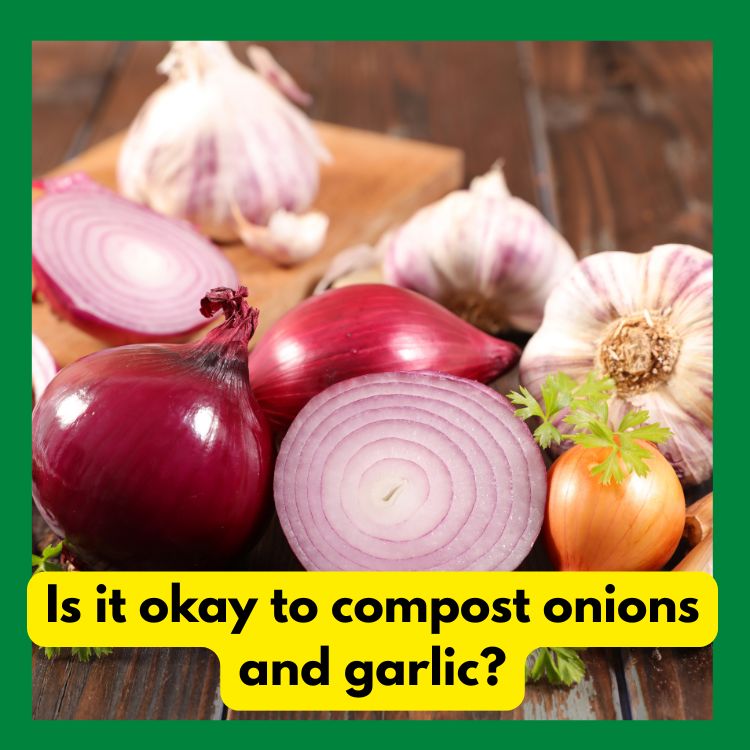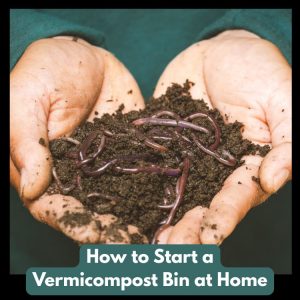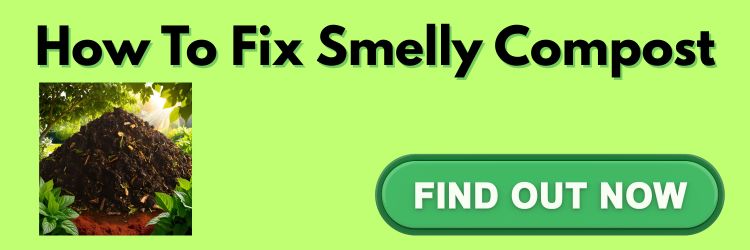If you want to know if Is it okay to compost onions and garlic? Then this is for you.
If love both and want to know the best way of dealing with them, read on…
As a gardener, I’ve often wondered if composting onions and garlic is a good idea. Some say no, while others see the benefits.
Onions and garlic are full of nutrients but can be very strong-smelling.

I will look into the good and bad of composting these ingredients.
Understanding how onions and garlic affect compost helps gardeners decide what’s best for their compost.
Key Takeaways
- Composting onions and garlic can be beneficial for gardeners.
- These ingredients add nutrients to the compost.
- However, they can also attract pests and create odors.
- Proper composting techniques can minimize potential issues.
- Gardeners should weigh the pros and cons before adding onions and garlic to their compost.
My Composting Journey with Alliums
When I started composting, I wasn’t sure about onions and garlic. Many gardeners were unsure if they could add these to their compost.
How I Started Composting Kitchen Scraps
I began composting to cut down on waste and make my soil better. I started with fruit and veg peels, tea bags, and coffee grounds.
Then, I wondered if onions and garlic could join the compost too.
My Initial Hesitations About Onions and Garlic
Onions and garlic are in many dishes, but I was unsure about composting them. I’d heard they might attract pests and smell bad.
So, I looked into how to compost them safely.
Learning about composting onions and garlic helped me create a good compost.
It showed me how important careful planning is for a healthy compost pile.
The Common Advice Against Composting Onions and Garlic
Onions and garlic are often seen as bad for composting. They might attract pests and smell bad. This idea has been around for a long time, shared by many gardeners.
Traditional Composting Rules
Old composting rules say to keep a balanced pile. They warn against adding things that might attract pests or smell bad.
Onions and garlic, being part of the Allium family, are seen as a problem because of their strong smell.
Why Many Gardeners Avoid Adding Alliums to Compost
Many gardeners don’t put onions and garlic in their compost. They worry about pests like rodents and flies.
The strong smells from these plants can also bother neighbors and animals.
It’s important to know the truth about composting onions and garlic. By understanding the issues, gardeners can decide if these plants belong in their compost.
With the right methods, composting onions and garlic can be done successfully. This helps reduce waste and makes the soil better.
Is It Okay to Compost Onions and Garlic? The Truth Revealed
As a gardener, I’ve often wondered if adding onions and garlic to my compost pile is a good idea.
The debate about composting these allium family members has sparked a lot of discussion. People have different opinions on their effects on soil and plant health.
Separating Fact from Fiction
Many gardeners are hesitant to compost onions and garlic because of worries about attracting pests and creating bad odors.
But, scientific research suggests these worries might be too much. In reality, onions and garlic can be composted successfully with the right management.
The key to composting onions and garlic is understanding how they decompose. Like other organic materials, they break down over time, adding nutrients to the soil.
But, because they are high in nitrogen, it’s important to balance them with carbon-rich materials to keep the compost healthy.
Scientific Perspective on Allium Composting
Studies have shown that composting onions and garlic doesn’t have a big negative impact.
In fact, they can add valuable nutrients to the soil, making it better for plants.
To compost alliums successfully, it’s key to balance their nitrogen-rich content with carbon-rich materials, like dried leaves or straw.
| Material | Nitrogen Content | Carbon Content |
|---|---|---|
| Onions | High | Low |
| Garlic | High | Low |
| Dried Leaves | Low | High |
| Straw | Low | High |
By understanding the science behind composting onions and garlic, gardeners can make informed decisions.
With proper management, alliums can be a valuable addition to the compost. This can ultimately benefit the soil and plants.
Understanding the Concerns: Odor Issues
Onions and garlic can make strong smells when composted. These smells might bother gardeners and neighbors.
Why Onions and Garlic Create Strong Smells
Onions and garlic have lots of sulfur compounds. When these break down, they release strong odors.
The smell comes from the sulfur compounds decomposing.
Moisture, temperature, and oxygen levels in the compost pile can make the smell worse.
How Odors Affect Compost Neighbors and Wildlife
The smells from onions and garlic can attract pests and wildlife. This might bother neighbors and local animals.
For example, rodents and raccoons might be drawn to the compost pile.
The smell can also be a problem for neighbors, especially in residential areas.
To solve these issues, gardeners need to manage composting well. They should balance the carbon-to-nitrogen ratio, keep moisture right, and ensure good air flow.
This way, they can reduce the smell and make composting better for everyone.
Pest Attraction: Do Onions and Garlic Really Invite Unwanted Visitors?
As a gardener, I’ve often wondered if onions and garlic in my compost heap attract pests. Some gardeners say not to compost these due to pest worries.
But my experience has shown it’s not always true.
Yes, pests like rodents and flies might be drawn to onions and garlic’s strong smell.
But, with good compost management, you can keep pests away.
Types of Pests Attracted to Allium Scraps
Pests like rodents, flies, and other insects might be attracted to onion and garlic scraps. To keep them away, bury these scraps deep in the compost pile.
Also, mix them with other materials to balance it out.
My Experience with Pest Management
In my experience, a balanced compost pile and regular turning help keep pests away. By following best practices for composting onions and garlic, I’ve composted without pests.
Whether to compost onions and garlic depends on your situation and composting habits. Knowing the risks and managing them can help you compost these scraps.
This way, you can make a nutrient-rich soil amendment for your garden.
The Decomposition Timeline of Alliums
The breakdown of onions and garlic depends on temperature and moisture. Knowing these factors is key to composting kitchen scraps well.
How Long It Takes for Onions and Garlic to Break Down
Onions and garlic are hard to compost because they decompose slowly. But, with the right conditions, they can break down quickly.
It can take a few weeks to several months for them to decompose.
Temperature Considerations
Temperature is very important for decomposition. Higher temperatures speed up the breakdown of onions and garlic. Lower temperatures slow it down.
The compost pile should be between 130°F and 140°F for best results.
Moisture Levels
Moisture is also crucial for decomposition. Onions and garlic need to be moist to break down well.
But, too much moisture can cause bad smells and attract pests.
| Factor | Ideal Condition | Effect on Decomposition |
|---|---|---|
| Temperature | 130°F – 140°F | Speeds up decomposition |
| Moisture | Adequate moisture | Facilitates breakdown |

By managing temperature and moisture, you can create the perfect environment for onions and garlic to decompose.
This not only reduces waste but also makes nutrient-rich compost for your garden.
My Successful Techniques for Composting Onions and Garlic
After trying different methods, I found a few ways to compost onions and garlic well.
These strategies help me avoid problems and make the most of these kitchen scraps in my compost.
Proper Preparation Methods
Getting onions and garlic ready for composting is crucial. It means chopping them up to help them decompose faster.
Chopping and Processing
Breaking onions and garlic into smaller pieces helps them decompose quicker. I use a food processor or chop them finely with a knife.
Pre-treatment Options
Some people suggest pre-treating onion and garlic scraps. They might bury them or let them dry before adding them to the compost.
But, I find that just chopping them up works best.
Strategic Placement in the Compost Pile
Where you put onions and garlic in the compost pile matters. I bury them deep in the pile with other materials.
This helps keep odors down and pests away.
Using these methods, I’ve successfully composted onions and garlic. It reduces waste and makes a great soil amendment for my garden.
If you’re new to composting or experienced, try these techniques.
Hot Composting vs. Cold Composting for Alliums
Choosing between hot and cold composting for onions and garlic depends on several factors. These include how fast they decompose and the risk of odors and pests.
Hot composting is often the better choice for onions and garlic. It reaches temperatures between 130°F and 140°F.
This heat kills off pathogens and weed seeds, making the compost better for gardens.
Why Hot Composting Works Better for Onions and Garlic
Hot composting is better for onions and garlic because it speeds up decomposition. This reduces the chance of bad smells and pests.
The high heat also breaks down the complex compounds in alliums, making nutrients easier for plants to use.
In my experience, hot composting is effective for onions and garlic. It creates a compost that’s rich in nutrients, improving soil fertility.
Creating the Ideal Temperature Conditions
To get the right temperature for hot composting, mix “green” and “brown” materials in the pile. “Green” materials include kitchen scraps like onions and garlic.
“Brown” materials are dried leaves or straw. Regularly turning and checking the pile’s temperature are key to reaching the high temperatures needed.
By following these steps, gardeners can compost onions and garlic successfully.
This method reduces waste and creates a valuable resource for gardens.
Balancing Your Compost with Onion and Garlic Waste
To compost onions and garlic well, you must balance the carbon-to-nitrogen ratio. Onions and garlic are rich in nitrogen.
This can upset the compost pile’s balance if not mixed with carbon-rich materials.
The Carbon-to-Nitrogen Ratio Explained
The carbon-to-nitrogen ratio is key in composting. Microorganisms need a mix of carbon and nitrogen to work well.
Aim for 2/3 “brown” materials (like dried leaves) and 1/3 “green” materials (like kitchen scraps).
Onions and garlic are “green” materials. So, you need to mix them with “brown” materials. This keeps your compost pile healthy.
| Material | Carbon-to-Nitrogen Ratio |
|---|---|
| Dried Leaves | 80:1 |
| Straw | 100:1 |
| Onions and Garlic | 10:1 |
| Kitchen Scraps | 15:1 |
Complementary Materials to Add with Alliums
To balance your compost with onions and garlic, add materials like dried leaves or straw. These “brown” materials are rich in carbon.
They help counteract the nitrogen in onions and garlic.
Mixing these materials creates a balanced compost pile. This pile will break down efficiently. It will also produce a nutrient-rich soil amendment for your garden.

By following these tips, you can compost onions and garlic successfully. This reduces waste and creates a nutrient-rich soil amendment for your garden.
Alternative Methods for Recycling Onion and Garlic Scraps
Traditional composting methods might not work for onions and garlic. But, there are other ways to recycle these scraps.
These methods help reduce waste and make your soil rich in nutrients.
Trench Composting Techniques
Trench composting is easy and effective. It avoids the problems of traditional composting.
Dig a trench 6-8 inches deep and bury your onion and garlic scraps.
Then, cover them with soil and add more on top. Over time, the scraps will break down and improve your soil.
Bokashi Fermentation for Allium Waste
Bokashi fermentation is another good option. It uses microorganisms to break down scraps in a controlled way.
You’ll need a special bin and Bokashi bran to start.
Add your onion and garlic scraps to the bin, then Bokashi bran. The microorganisms in the bran will ferment the scraps, reducing odors and pathogens.
Vermicomposting Considerations
Vermicomposting, or worm composting, is also a good choice. But, you need to be careful with onions and garlic.
Worms can be sensitive to their oils and compounds.
Start by adding small amounts of onion and garlic scraps. Watch how the worms react to them.
| Composting Method | Description | Benefits |
|---|---|---|
| Trench Composting | Burying scraps in a trench | Avoids odor issues, enriches soil |
| Bokashi Fermentation | Using microorganisms to break down scraps | Reduces odors and pathogens, creates nutrient-rich fertilizer |
| Vermicomposting | Using worms to compost scraps | Creates high-quality compost, can be done indoors |
Exploring different composting methods can help you find what works best.
Whether it’s trench composting, Bokashi fermentation, or vermicomposting, you’ll reduce waste and make your garden more sustainable.
The Benefits of Successfully Composted Alliums in Your Garden
Composting onions and garlic is great for gardeners. It makes a soil amendment full of nutrients. This helps plants grow strong and healthy.
Onions and garlic compost is packed with good stuff. Onions have phosphorus, which is key for roots and plant health.
Garlic adds sulfur, boosting soil fertility. Together, they make plants stronger.
Nutrient Content of Onion and Garlic Compost
Composted onions and garlic are full of micronutrients. Onions give phosphorus for roots, and garlic’s sulfur makes soil more acidic.
This is good for plants that like slightly acidic soil.
How My Plants Responded to Allium-Rich Compost
Using allium-rich compost in my garden made a big difference. My tomatoes and peppers grew bigger and produced more.
The compost also made the soil better at holding water and air.
By composting onions and garlic, gardeners can make a valuable resource for their plants. With the right composting, you can enjoy a bigger harvest.
Can You Compost Onion Skins? Oh, Peel Yeah, You Can!
Conclusion
Exploring composting onions and garlic shows they can be great for your compost pile. Knowing how to handle odor and pests is key.
Techniques like hot composting and balancing carbon-to-nitrogen ratios help.
Composting onions and garlic reduces waste and makes your soil better. My experience shows that preparation and the right conditions are crucial.
So, yes, you can compost onions and garlic if you follow the right steps.
Adding onions and garlic to your compost helps your garden grow better. It makes your garden healthier and more fertile.
So, definitely, you can compost onions and garlic for your garden’s benefit.
FAQ
Is it okay to compost onions and garlic?
Yes, you can compost onions and garlic. But, you need to do it right to avoid problems like bad smells and pests.
What are the concerns about composting onions and garlic?
Onions and garlic can make your compost smell bad. They might also attract pests. And, they can slow down the composting process if not done right.
How can I minimize the odor when composting onions and garlic?
To cut down on smells, balance the compost’s carbon and nitrogen levels. Bury onion and garlic scraps deep in the pile. Make sure it’s well-aired and moist.
What pests are attracted to onion and garlic scraps in compost?
Pests like rodents, flies, and insects are drawn to onions and garlic. Use pest-repellent materials. Keep your compost clean and ensure it decomposes well.
How long does it take for onions and garlic to break down in compost?
Onions and garlic break down in several weeks to months. This depends on temperature, moisture, and the compost’s carbon-to-nitrogen ratio.
What is the best method for composting onions and garlic?
Hot composting is good for onions and garlic. It breaks them down fast and kills pathogens. But, trench composting and Bokashi fermentation also work well.
Can I compost onions and garlic using vermicomposting?
Vermicomposting, or worm composting, is an option for onions and garlic. But, you must watch the worms and the compost’s conditions closely.
What are the benefits of using composted onions and garlic in my garden?
Composted onions and garlic add nutrients and improve soil. They also boost microbial activity. This makes your garden healthier and more productive.
How can I balance the carbon-to-nitrogen ratio when composting onions and garlic?
To balance the compost, add materials like dried leaves, straw, or shredded newspaper. These help counteract the nitrogen from onions and garlic.







